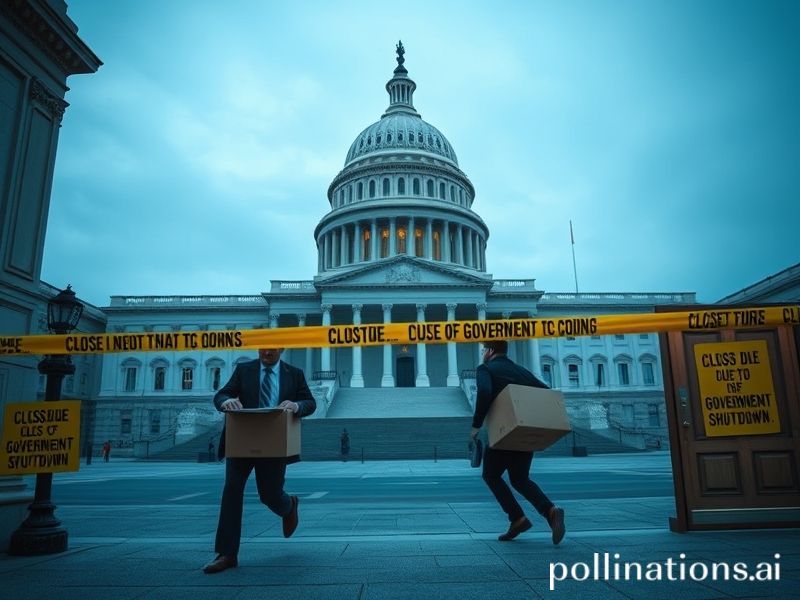Global Eye-Roll: How America’s Government Shutdown Becomes the World’s Unpaid Reality Show
**When the World’s Largest Economy Forgets to Pay the Electric Bill**
*By Our Correspondent Who’s Seen This Movie Before*
America, that shining city upon a hill, occasionally likes to switch off its own lights just to remind everyone it’s still the main character. While the rest of the planet scrambles to keep the fluorescent bulbs humming in hospitals, airports, and that one customs booth in Djibouti that still uses a fax machine, the United States has once again wandered into the theatrical purgatory known as a “government shutdown.” Cue the world’s collective eye-roll, audible from Ulan Bator to Uruguay.
For the uninitiated, a shutdown is what happens when Congress—think of a dinner party where nobody likes the host, the menu, or each other—fails to approve the budget. Overnight, 800,000 federal employees discover their paychecks have been replaced by thoughts and prayers. National parks turn into ad-hoc communes run by raccoons with excellent organizational skills. Somewhere, a TSA agent pays for a Subway sandwich with pocket lint and dignity. Meanwhile, Statue of Liberty selfies still get taken, because nothing says “land of the free” like climbing a closed monument under the watchful eye of an unpaid park ranger wondering if ramen qualifies as a food group.
Internationally, the spectacle is greeted with the diplomatic equivalent of a sympathy bouquet made of rubber bands. European allies sigh into their morning espresso: *“Again?”* Asian markets price in another round of USD volatility the way one budgets for an alcoholic uncle at Christmas—inevitable, embarrassing, yet weirdly priced into the cake. China’s state media barely suppresses a schadenfreude giggle while explaining to citizens that, yes, even *laobaixing* in the benevolent People’s Republic receive salaries on time; please ignore the property developer handcuffed in the background.
Developing nations watch with darker bemusement. When Washington sneezes, the Global South catches pneumonia—only this time the sneeze is self-inflicted, and the pharmacy is closed because FDA inspectors were sent home. World Bank climate projects stall; shipments of antiretroviral drugs sit in customs warehouses next to crates of artisanal Iowa cheese nobody will sample for months. In Nairobi, a startup founder waiting on a U.S. patent laments that America can’t keep its own lights on yet still lectures others about efficiency. He has a point, but he also still wants that Silicon Valley seed round, proving capitalism is the ex we all claim to hate until last call.
Defense analysts quietly panic: those F-35s may be stealth, but the civilians who maintain their stealthiness just joined the gig economy. Somewhere in the Strait of Hormuz an aircraft carrier floats like a very expensive paperweight while contractors debate whether to invoice in euros, yen, or canned goods. Russia, perennial fan of American self-sabotage, sends polite diplomatic cables offering humanitarian aid—translated loosely as: *“Need a loan? We accept Alaska.”*
The United Nations, accustomed to U.S. arrears, keeps a running tab taped next to the “No Smoking” sign in the General Assembly. Peacekeepers in Mali wait for reimbursements that may arrive sometime after the heat death of the universe. Diplomats rehearse the art of looking busy; the cafeteria introduces a shutdown special: *“Congressional Gridlock Chili—served cold, obviously.”*
And yet, like a Broadway show with unlimited encore funding, the curtain always rises again. Lawmakers reach a deal at 3 a.m., proclaiming victory over the very abyss they choreographed. Federal employees return to find 3,000 emails and one moldy coffee mug. Ratings agencies issue stern warnings nobody reads; economists recalibrate GDP forecasts by 0.02 percent and call it a day. The world exhales, re-books dollar-denominated debt, and updates the Doomsday Clock to *“still stupid, but functional.”*
Until next season, when the same script is pulled from the drawer, dusted off, and performed with the enthusiasm of a sitcom reunion episode. Because if America is exceptional at anything, it’s holding itself hostage and expecting applause. The rest of us? We’ll be in the audience, nursing overpriced wine, secretly grateful for the reminder that the globe’s most reliable export is still high-budget farce—complete with explosions, cliff-hangers, and a cast that can’t remember their lines but always remembers to get paid…eventually.







